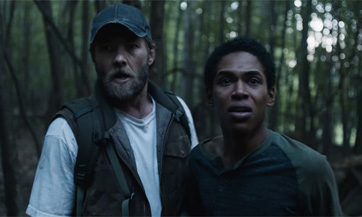The 400-Word Review: It Comes at Night
By Sean Collier
June 12, 2017
Even as the ascendant studio A24 receives its loudest plaudits for traditional arthouse fare such as 20th Century Women, Room and Free Fire, it is also (blessedly) emerging as the most reliable distributor of contemporary horror. Last year’s one-two punch of The Witch and Green Room was undeniable; the science fiction and horror hybrids Under the Skin and Ex Machina were just as essential.
(We won’t talk about Tusk.)
The young house’s tradition of taut, effective scares continues with It Comes at Night, one of the most stripped-down survivalist parables in recent memory, despite a culture full of them. A sudden, lethal plague has swept the country, if not the globe; survivors hide where they can, hoping to avoid contact with the infected (the film’s title gives some clue as to the method of transmission, but that’s about all we’ll get).
Paul (Joel Edgerton), Sarah (Carmen Ejogo) and Travis (Kelvin Harrison, Jr.) are clinging to routine in a forest cabin after the death of Sarah’s father, a victim of the unnamed illness. When a stranger (Christopher Abbott) mistakes their home for an abandoned building and forces his way in, Paul must choose between isolation and the possibility of safety or, in helping the newcomer and his family (Riley Keough and Griffin Robert Faulkner), preserving his humanity.
It’s best not to read any politics in this tale of safety and compassion; I don’t believe there is any allegory at hand, here (although plenty could be said about the simultaneous fear and fetishization of the other, as demonstrated in an unforgettable dream sequence). Instead, I think It Comes at Night is a reflection on and discussion of the tropes of the genre. Horror itself, and many of its subgenres especially, concerns itself greatly with the demands of survival and suspicion under extreme duress; It Comes at Night posits that there is a certain fatal absurdism to these efforts. When the world is ending, can one do much more than prolong the inevitable?
Edgerton, occasionally something of a flat presence, gives perhaps his best performance; Ejogo and Keough’s wonderfully raw, desperate work is award-caliber. Writer/director Trey Edward Shults, in his sophomore effort (after Krisha), challenges himself with a tremendously sparse and bare script; he is up to the challenge, as the unbroken tension carries It Comes at Night through a handful of slow stretches. This is vital horror — and essential filmmaking.
My Rating: 9/10
Sean Collier is the Associate Editor of Pittsburgh Magazine and a member of the Broadcast Film Critics Association. Read more from Sean at pittsburghmagazine.com/afterdark




